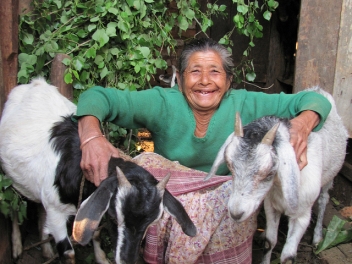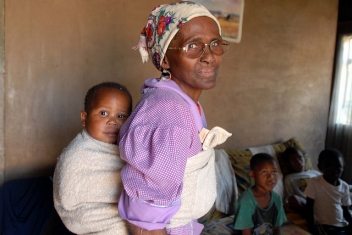Older women are critical to achieving the MDGs, so why are they discriminated against by society – and by development targets?
The Millennium Declaration on which the MDGs are all based, pledged “to promote gender equality and the empowerment of women as effective ways to combat poverty, hunger and disease”.
However, fundamental principles of gender equality and non-discrimination are only partly reflected in the Millennium Development Goals themselves.
Poverty reduction strategies ignore older women
Goal 3 on gender equality is reduced to one target on gender – disparity in education. And the MDGs do not require states to identify and reach the most marginalised, including older women, and to eliminate discrimination.
Data is not disaggregated by age, sex, disability or ethnic origin, so discrimination remains invisible.
Consequently, poverty reduction strategies generally ignore older women who continue to face discrimination, violence and abuse and who, after a lifetime of gender inequality, are some of the poorest and most marginalised in society.
Despite this, the contribution that older women make to development and accelerating progress towards the MDGs is absolutely critical.
MDG1: Poverty, hunger and decent work
 Older women play a key role in reducing the poverty and hunger of their families and households in which they live.
Older women play a key role in reducing the poverty and hunger of their families and households in which they live.
In some of the least developed countries, as many as 80% of women are in the labour force, often in informal, insecure and poorly paid jobs but, nevertheless, making a significant contribution to the income of their households.
In fact the number of older women in the work force increased in all regions between 2006 and 2009 [1]. If their efforts are supported, this contribution is greatly enhanced. For example, when older women receive a pension, they often spend this on food, improving nutrition.
In South Africa, for instance, girls living in a household with an older woman receiving a pension were 3-4 centimetres taller than girls living in a household without a pension.
MDGs 2 and 3: Universal education and gender equality
We also know that older women play a vital role in ensuring that young children in their care, particularly girls, get a primary education.
Again, research in South Africa has shown that among the poorest 25 per cent of all households, girls who live in households which receive a non-contributory pension are 7 per cent more likely to be enrolled full time in school than girls living in households without a pension [2].
MDG 6: Combat HIV and AIDS
 Older women’s role as carers of people living with HIV and AIDS and of young children is critical to progress towards MDG 6.
Older women’s role as carers of people living with HIV and AIDS and of young children is critical to progress towards MDG 6.
HelpAge found that 88% of older people caring for grandchildren in a recent study in Tanzania were widows.
And in a similar study in Ethiopia two thirds were widows [3]. Supporting older women in their caregiving roles is essential to accelerating progress on the MDGs on combating HIV and other diseases, as well as education, child mortality and hunger.
Action is essential
If progress towards the MDGs is really going to be accelerated then some actions are essential:
- Non-contributory pensions are an affordable, gender-sensitive way to reach poor people and should be considered as one of the critical components in comprehensive social protection mechanisms.
- The UN MDG database must immediately recognise the need for and start collecting age- and sex-disaggregated data. This is to ensure the existing MDGs are evaluated effectively and that a more equitable post-2015 poverty reduction framework is reached.
- Everyone is naturally focusing on what needs to be done between now and 2015 but we must also make sure that older women, and men, are central to the post MDG debate. We must ensure any new poverty reduction framework responds to the impact of ageing on development and addresses the multiple forms of discrimination that poor people experience.
Read our news story, Social transfers for older people critical to MDGs
Visit our MDG photogallery
References:
[1] UNDESA, Population Ageing and Development Chart, UNDESA 2009,
[2] Samson M et al, ‘The Social and Economic Impact of South Africa’s Social Security System’, EPRI Research Paper Number 37, 2004, p73
[3] Susan Erb, One Size does not fit all, July 2010, unpublished
